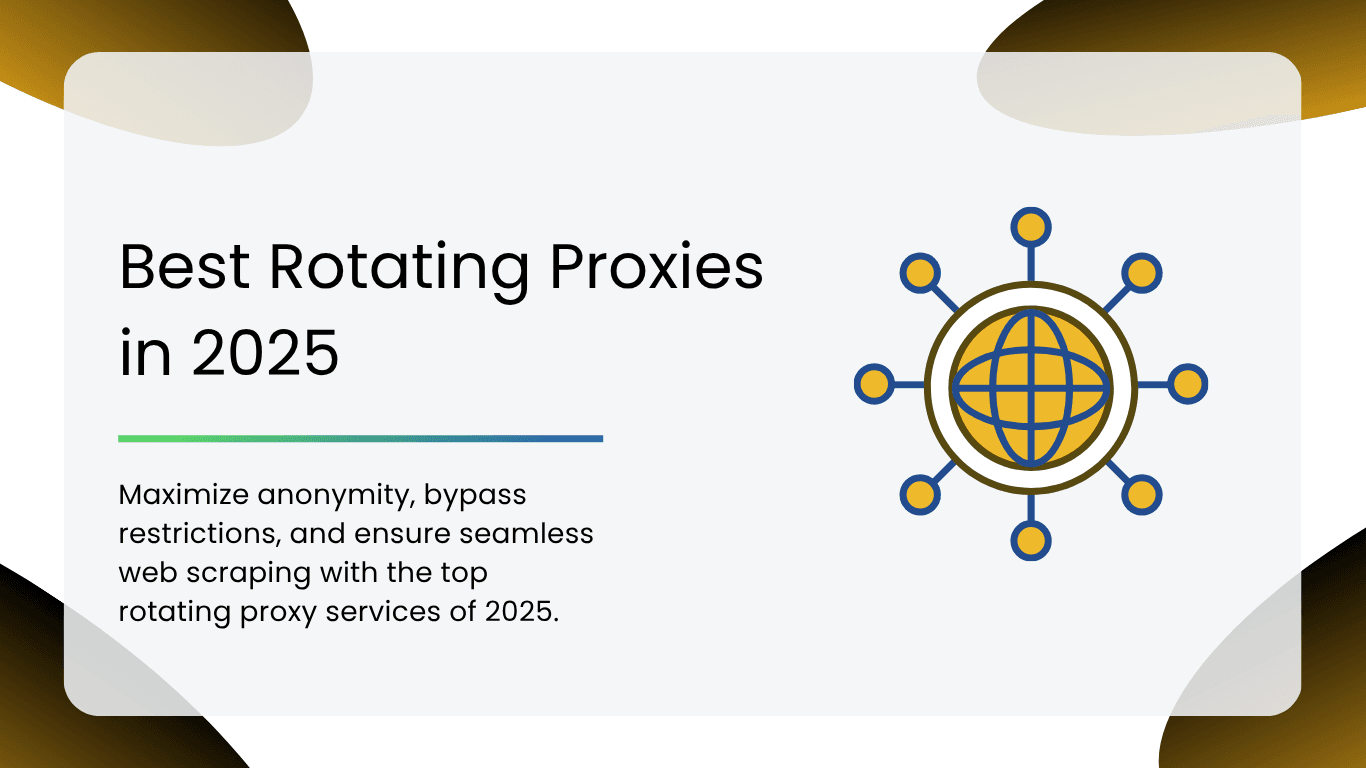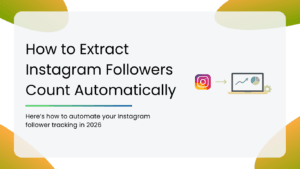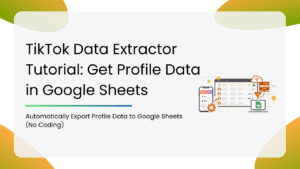Whether you’re scraping data, managing multiple accounts, or running bots in stealth mode, you know one thing for sure that IP bans are the enemy, and nothing dodges them better than a solid rotating proxy.
In 2025, rotating proxies have gone from being a niche to a necessity. They don’t just mask your IP but also switch it constantly, which makes it nearly impossible for websites to track or block you. The result? Cleaner data, fewer CAPTHAs, and way less stress.
This blog breaks down top handpicked rotating proxy providers. This will help you get a clear look at what each tool offers, how their IP rotation works, and what makes them worth your time.
What is a Rotating Proxy?
Imagine every time you visit a website, you show up with a different face. That’s basically what a rotating proxy does: it changes your IP address at regular intervals or with every request, so it looks like different people are accessing the site instead of just you.
A rotating proxy automatically swaps your IP from a larger pool of real-user addresses. This makes it much harder for websites to detect or block you, which is especially useful for web scraping, SEO tracking, managing multiple social accounts, or copping limited-edition drops.
There are usually two types of rotation:
- Time-based rotation: Your IP changes every few minutes.
- Request-based rotation: Your IP changes with every HTTP request.
Compared to static or datacenter proxies, rotating proxies offer better anonymity, lower ban risk, and smoother automation.
Key Features to Look for in a Rotating Proxy
- Large, Clean IP Pool: Always go for providers with millions of residential or mobile IPs that aren’t flagged or overused.
- Flexible Rotating: Look for time-based, request-based, and sticky session options depending on your task.
- Geo-Targeting: Choose tools that let you select IPs by country, city, or ASN for your location-specific needs.
- Fast Speed & Stable Uptime: A good proxy should run quietly in the background without slowing things down.
- Protocol & Platform Compatibility: Make sure it supports HTTP, HTTPS, or SOCKS5 and works with your software stack.
Comparison Table: Best Rotating Proxy Providers in 2025
| Proxy Name | Best For | Key Features |
| Oxylabs | High-volume enterprise scraping, SEO, and data mining | 175M+ residential IPs + 20M+ mobile- AI-powered rotation and sticky sessions- ISP, ASN, and city-level targeting- Supports large-scale scraping with scraper APIs- Strong session management and retry logic |
| Webshare | Businesses and individual users, marketing and SEO professionals | 80M+ residential IPs – developer friendly support – Track performance through custom proxy lists |
| Decodo | Beginners and budget-conscious users who want performance and simplicity | 155M+ residential & mobile IPs- Per-request and time-based rotation (1–30 min)- Sticky sessions up to 30 minutes- Geo-targeting to city and ASN- Unlimited connections, simple dashboard & API |
| Bright Data | Enterprise-grade scraping and advanced customization | 72M+ residential IPs (150M+ total)- Per-request, time-based, and sticky session rotation- Geo-targeting down to city, ASN, and ZIP- Supports HTTP, HTTPS, and SOCKS5- Failover, retries, caching, and real-time analytics |
| NetNut | High-speed, low-latency rotating proxies with great stability | – 85M+ residential IPs + mobile IPs- Session-based and per-request rotation- Sticky sessions available- HTTP, HTTPS, SOCKS5 protocol support- One-hop architecture with high success rates |
| Storm Proxies | Budget-friendly solution for sneakers, bots, and small-scale scraping | – Backconnect rotating residential proxies- Rotation every 5 or 15 minutes- Unlimited bandwidth on most plans- Simple setup via rotating endpoints- Shared IP pools |
| IPRoyal | Freelancers, light users, and cost-conscious scraping | – Residential and datacenter proxies- Pay-as-you-go pricing (per GB)- Sticky session and basic rotation options- Clean, ethically sourced IPs- Simple dashboard and API access |
| SOAX | Geo-precise scraping and advanced targeting control | 155M+ clean residential and mobile IPs- Per-request and timer-based rotation- Sticky sessions up to 30 minutes- Geo-targeting by country, city, ASN, carrier- Real-time proxy validation and filtering |
| Infatica | Privacy-focused, large-scale enterprise automation | – Residential IPs from 100+ countries- Session persistence up to 30 minutes- Rotation per request or by time- Targeting by ASN, country, carrier- Transparent sourcing and GDPR compliance |
Table of Contents
| 1. Oxylabs |
| 2. Webshare |
| 3. Decodo |
| 4. BrightData |
| 5. NetNut |
| 6. Storm Proxies |
| 7. IPRoyal |
| 8. SOAX |
| 9. Infatica |
Best Rotating Proxies in 2025
1. Oxylabs
Oxylabs is another enterprise-grade solution that’s known for its powerful infrastructure and ethical sourcing. It’s used by companies for data mining, SEO monitoring, and market research.
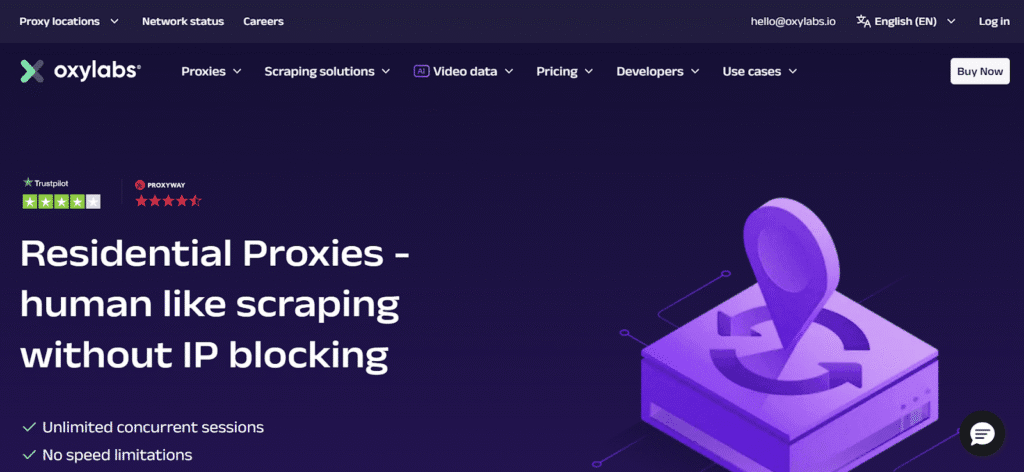
Key Features
- Massive Rotating Pool: 175M+ residential IPs rotate on request or by time interval.
- AI-Based Rotation Logic: Uses AI to rotate proxies more intelligently based on site behaviour and success rate.
- City & ISP-Level Targeting: Drill down to rotate through proxies from specific cities, ISPs, or carriers.
- Sticky IP Support: Maintain a single IP for up to 30 minutes if needed.
- Dedicated Scraping APIs: Combine with SERP and e-commerce Scraper APIs for smarter rotating behaviour.
- Session Management Tools: Detailed options for controlling rotation frequency, retries, and failover as well.
Pros:
- Highly Stable IP Rotation: Perfect for complex sites with anti-bot systems, so rotations rarely break sessions.
- Enterprise-Level Control: You can tweak everything from rotation intervals to header behaviour.
- Reliable for Heavy Tasks: Handles millions of requests per day with strong IP diversity.
Cons:
- Advanced Setup Required: You’ll likely need a dev or scraper on the team in order to use its full rotation capabilities.
2. Webshare
Webshare offers easy-to-use, low cost rotating proxies that are best suited for small businesses and individual users that need a reliable level of anonymity and data access. Its simple setup and flexible plans cover a variety of use cases like data management, web scraping, e-commerce product analysis, market research and social media management.
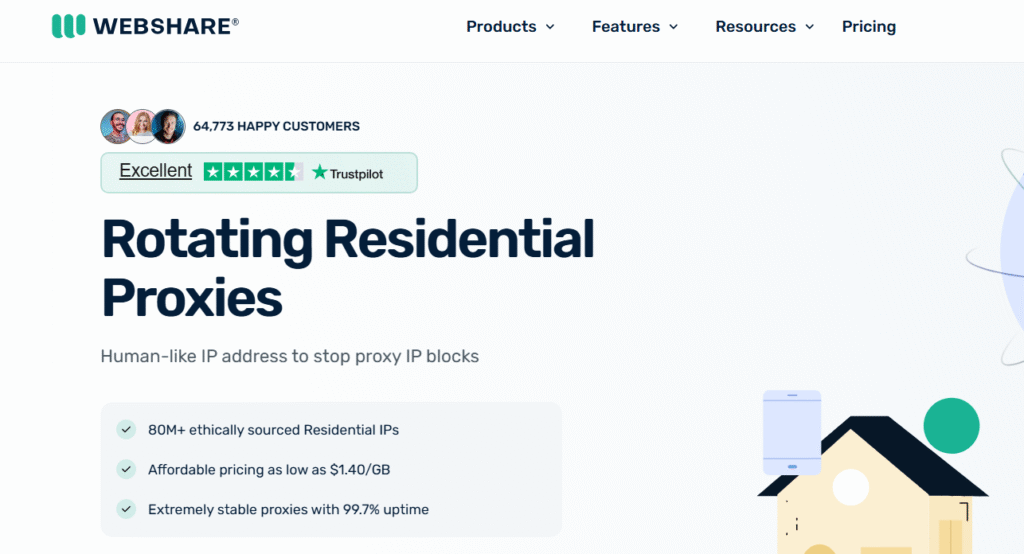
Key Features
- Vast IP Pool: Access to 80M+ Residential IPs from 195+ global locations.
- Customization and Scalability: Enterprise grade proxy servers offer scalable solutions and custom plans tailored to specific needs.
- Developer-Friendly Tools: Features like a dashboard that allows downloading proxy lists as a file or using an API, API Docs for restful proxy APIs and developer support for fast integration are available.
- Educational Resources: Webshare Academy offers resources like “Web Scraping 101” to help users learn scraping techniques.
- Free Access and Trials: Users can get 10 free proxies for up to 1GB/month bandwidth, completely free for an unlimited amount of time with no credit card or trial period required.
Pros:
- High Reliability and Speed: Rotating residential proxies are described as a high-speed and high-reliability alternative to standard proxies by offering premium performance and stability.
- Protocol Support: Both SOCKS5 and HTTP Proxy protocols are supported, allowing integrations with various applications.
- Ethical Sourcing: The rotating proxy pool is ethically sourced from carefully selected partners that uphold business ethics and strict compliance with Tier A model proxies.
Cons:
- Payment Method Limitations: Google Pay and Apple Pay payment options are only accessible through mobile devices.
- Unsuited for sticky sessions: IP changing can break sessions which can get tricky if you want to maintain session persistence.
3. Decodo
Decodo is a strong alternative to Bright Data, especially for users who want similar power without the huge price tag. Ultimately, it is beginner-friendly but still advanced enough for pros.
Key Features
- Rotating Residential Proxies: IPs rotate automatically on each request or every 1, 10, or 30 minutes, depending on your use.
- 55M+ Residential IPs: Large global pool to rotate from that are sourced ethically from real users.
- Endpoint Rotation: Simple static endpoints that manage the rotation for you. Hence, great for plug-and-play use.
- Sticky Sessions: Provides the option to keep the same IP for up to 10 minutes if needed.
- City-Level Targeting: Choose IPs from specific cities for local-level scraping.
- Easy API & Dashboard: Manage rotation rules and monitor usage visually or via API.
Pros:
- Beginner-Friendly Rotations: Just plug in the rotating endpoint, and no deep config is needed.
- Affordable Compared to Bright Data: Delivers reliable rotating proxies at a more accessible price point.
- Fast & Stable Rotation Performance: Especially good for e-commerce scraping, SEO, and social media tools.
Cons:
- No Mobile Rotating Proxies in Base Plans: You’ll need custom plans if you want mobile IP rotation.
- Limited Session Duration: Sticky sessions expire after 10 minutes, which might be too short for some workflows.
- No Per-Second Rotation: If you need an IP change every second/request, you’ll need a custom setup.
4. Bright Data
Bright Data is one of the biggest and most powerful proxy providers in the world. It’s trusted by enterprises and serious data scrapers. Their residential rotating proxies are top-tier in terms of both quality and control.
Key Features
- Residential Rotating Proxies: Automatically rotates IPs from a pool of over 72 million real devices worldwide.
- Sticky Sessions & Rotation Rules: Choose how often your IP rotates, such as per request, every X seconds, or via session.
- Geo-Targeting: Narrow your targeting down to city, carrier, or even ASN level for ultra-precise requests.
- Proxy Manager Tool: Fine-tune rotation settings, headers, and request logic with their free local proxy manager.
- Failover & Retry Handling: Automatically switches to a new IP when one fails, mostly for large-scale scraping.
- Speed Optimization Tools: Smart rotation that balances anonymity with fast response time.
Pros:
- Industry-Leading IP Rotation Control: You can customize exactly how and when IPs rotate. Thus, giving you total control.
- Global Coverage At Scale: Massive residential IP pool lets you rotate through real devices in nearly every country.
- Built For Performance: Even under heavy loads, rotations are fast and smooth with minimal drop-off.
Cons:
- Expensive for Solo Users: It’s built for large teams or enterprise scraping. Therefore, pricing scales up quickly.
- Complex Setup For Beginners: Too many configuration options can feel overwhelming if you just need basic rotation.
- Strict KYC Verification: You’ll need to provide ID and usage reason, which might be a dealbreaker for some.
5. NetNut
NetNut provides rotating residential proxies with a global IP pool of over 85 million across 195 countries. These proxies rotate by default with each session and support sticky session options when sustained IP usage is needed.
Key Features
- Extensive IP Pool: Over 85M+ residential IPs plus millions of mobile IPs, spread across nearly 200 countries.
- Automatic Rotation: Each session uses a fresh IP unless sticky session is enabled to maintain continuity across requests.
- Sticky Session Support: Maintain the same IP for multiple requests, and you also get to choose the session length based on your task.
- Protocol Support: Works with HTTP, HTTPS, and SOCKS5 protocols for broad compatibility.
- High Success and Low Fail Rates: One-hop architecture (no P2P) provides stable, fast connections with a 99% success rate and excellent CAPTCHA bypass capabilities.
Pros
- Massive, high-quality IP pool ensures minimal reuse and less blocking.
- Flexible rotation modes, including per-request and sticky sessions that suit both scraping and account-based workloads.
- Provides top-tier performance, thanks to direct ISP connections that offer fast, stable speeds and minimal latency.
- Unlimited concurrent sessions let you scale scraping or automation without bottlenecks.
- Detailed dashboard & API-level stats let you monitor usage, manage endpoints, and troubleshoot easily.
Cons
- Higher price point compared to other budget providers, and even the enterprise features come at a premium.
- Advanced setup may be complex for beginners, given all the configuration options and session controls.
- City-level targeting is available in limited regions, and more granular geo-targeting requires research or support.
6. Storm Proxies
Storm Proxies is a budget-friendly option best suited for small-scale users, like sneaker coppers, social media managers, or basic web scrapers. It’s not fancy, but it gets the job done.
Key Features
- Backconnect Rotating Residential Proxies: Automatically rotate IPs from a pool of real users.
- Fixed Rotation Times: IPs change every 5 minutes or 15 minutes, depending on the endpoint.
- Unlimited Bandwidth: Most plans come with no data cap, which is rare at this price.
- Shared Proxy Pools: You rotate through a shared group of IPs where there is less control, but cheaper.
- Easy Integration: Rotating endpoints are ready to use, and users have to just copy and paste them into their scraper or browser.
Pros:
- Affordable Entry Point for Rotating Proxies: One of the cheapest legit rotating proxy providers out there.
- Simple to set up: Good for sneaker bots, basic scrapers, or small-scale tasks.
- Unlimited Use: Great if you want constant rotation without worrying about bandwidth.
Cons
- Limited Rotation Options: No per-request rotation. Thus, you’re stuck with 5-15 min intervals.
- Small IP Pool: The number of available rotating IPs is far lower than that of enterprise-grade providers.
- Shared Pool = Less Clean IPs: Because proxies are shared, you might hit more CAPTCHA or bans.
7. IPRoyal
IPRoyal offers a flexible, pay-as-you-go proxy service. This makes it ideal for freelancers, startups, and small businesses. Launched in 2020, IPRoyal has gained traction for its transparent pricing and ethically sourced residential proxies.
It provides a lightweight proxy dashboard where users can manage sessions, rotate proxies, and monitor usage. Its API enables basic automation for users looking to scale up small projects.
Key Features
- Rotating Residential & Datacenter Proxies: It has a mix of both for different needs.
- Pay-Per-GB Pricing: Users can pay only for what they use instead of paying a huge amount.
- Multichannel Support Around the Clock: Users can get the top-to-bottom support they need to succeed, with seamless collaboration between engineering teams and senior technicians, anytime, on any platform.
- Simple Rotation Setup: It has an easy automated setup process with a dashboard that is simple, clear, and efficient.
- Precise Targeting: It offers unmatched accuracy with its industry-leading targeting for Residential proxies that allows you to pinpoint locations with precision.
Pros
- Budget-Friendly for Rotating IPs: It is one of the cheapest options for light users.
- Transparent Sourcing: It has ethically obtained residential IPs.
- Beginner-Friendly: IPRoyal has a straightforward dashboard that is simple and clear.
Cons
- Smaller IP Pool: Rotates through fewer IPs than premium providers, so higher risk of repeat IPs.
- Fewer Locations: It offers less coverage than premium providers.
- Basic Features: It also lacks AI rotation or advanced anti-blocking.
8. SOAX
SOAX is a premium proxy provider that offers clean, ethically sourced residential and mobile rotating proxies. What sets it apart is precision, the control it gives you over targeting, rotation rules, and session duration. It’s ideal for users who need fine-tuned rotating proxies for tasks like scraping, market research, and SEO monitoring.
Key Features
- Rotating Residential Proxies: IPs rotate automatically based on request or session.
- Precise Geo-targeting: Filter IPs by country, region, city, carrier, or ASN, which is useful for localized scraping.
- Sticky Sessions: Maintain sessions with the same IPs for up to 10-30 minutes.
- Clean IP Pool: SOAX filters out bad or blacklisted IPs to improve your rotation success rates.
- Real-Time Proxy Filtering: Only use live, verified proxies to avoid failed requests.
- Flexible Rotation Modes: Rotate IPs per request, per session, or on a custom timer.
Pros
- Highly Customizable Rotations: Full control over how, when, and where IPs rotate.
- Clean & Reliable IPs: You rotate through a vetted, regularly updated IP pool.
- Geo-Focused Accuracy: Especially strong for regional market data scraping or ad testing.
Cons
- Steep Learning Curve: All the advanced targeting and filters take some time getting used to.
- Session Time Limits: Sticky IPs are limited to a max duration, which may not suit every use case.
9. Infatica
Infatica is a lesser-known but powerful proxy provider offering rotating residential proxies with a strong focus on compliance, privacy, and performance. It’s especially useful for commercial-scale operations that need stable rotating IPs with flexible control.
Key Features
- Residential Rotating Proxy network: Real-user IPs rotate automatically on every request or timed session.
- Session Persistence: Keep the same IP for longer scraping flows, for up to 30 minutes per session.
- Large Global IP Pool: Residential proxies from 100+ countries for location-specific rotation.
- ASN, Carrier & Country-Level Targeting: Choose exactly where you want your rotated IPs to come from.
- Compliance-First Approach: Fully transparent about proxy sourcing and GDPR compliance.
- Usage Analytics Dashboard: Monitor how many IPs are rotating, your traffic, and success rates.
Pros
- Stable IP Rotation for Large Projects: Works well even when sending thousands of requests per hour.
- Good Targeting + Rotation Balance: Enough flexibility for advanced use cases without overwhelming setup.
- Strong Data Privacy Reputation: Infatica’s proxies are clean and responsibly sourced.
Cons
- More Focused on Enterprise Needs: Smaller-scale users might find the dashboard too detailed or feature-heavy.
- Higher Entry Pricing: Not ideal if you’re just experimenting or working solo.
How to Choose the Right Rotating Proxy?
- Match the Proxy to Your Use Case: Scraping, ad verification, sneaker bots, and social media each need different features.
- Check IP Reputation: Clean, trustworthy IPs mean fewer bans and smoother automation.
- Look for Control & Analytics: Look for a solid dashboard that helps you manage sessions, monitor usage, and avoid waste.
- Prioritise Transparency & Support: Go with providers that clearly show pricing, limits, and offer real customer support.
- Start Small, then Scale: Choose a tool that fits your budget now, but can grow with So don’t just look for the biggest IP pool or the flashiest dashboard.
Conclusion
Let’s be honest: most people don’t need half the features these proxy providers offer.
What really matters is this: Does it work when you need it to? Can it stay hidden, stay fast, and stay out of the way?
In 2025, the most effective rotating proxies are defined by more than just their size or speed. What truly matters is reliability, stability, and their ability to handle complex tasks without interruption. It’s about efficient access, consistent performance, and maintaining anonymity without drawing attention.
Check out our other blogs for more AI tools and insights
- Best Proxy Manager Platforms in 2025
- Forward Proxy vs Reverse Proxy: What’s the Difference?
- Top Web Scraping Proxies in 2025
FAQs
Rotating proxies change your IP address automatically over time or per request, making your traffic appear as if it’s coming from multiple users. Static proxies that are also called dedicated or persistent proxies, use the same IP every time, which can be useful for account-based tasks but is easier for websites to track and block.
– Time-based rotation changes the IP every X seconds or minutes.
– Request-based rotation assigns a new IP with every HTTP/S request.
Look for providers that:
– Ethically source their IPs (residential or mobile).
– Offer transparency around proxy reputation.
– Filter out blacklisted or flagged IPs (e.g., SOAX, Infatica, Bright Data).
You typically replace the proxy settings in your code or bot with the rotating endpoint provided by your proxy provider. Many providers also offer:
– Proxy managers (e.g., Bright Data)
– API integrations (e.g., Decodo, Oxylabs)
– Dashboard tools for easy rotation config
Disclosure – This post contains some sponsored links and some affiliate links, and we may earn a commission when you click on the links, at no additional cost to you.

